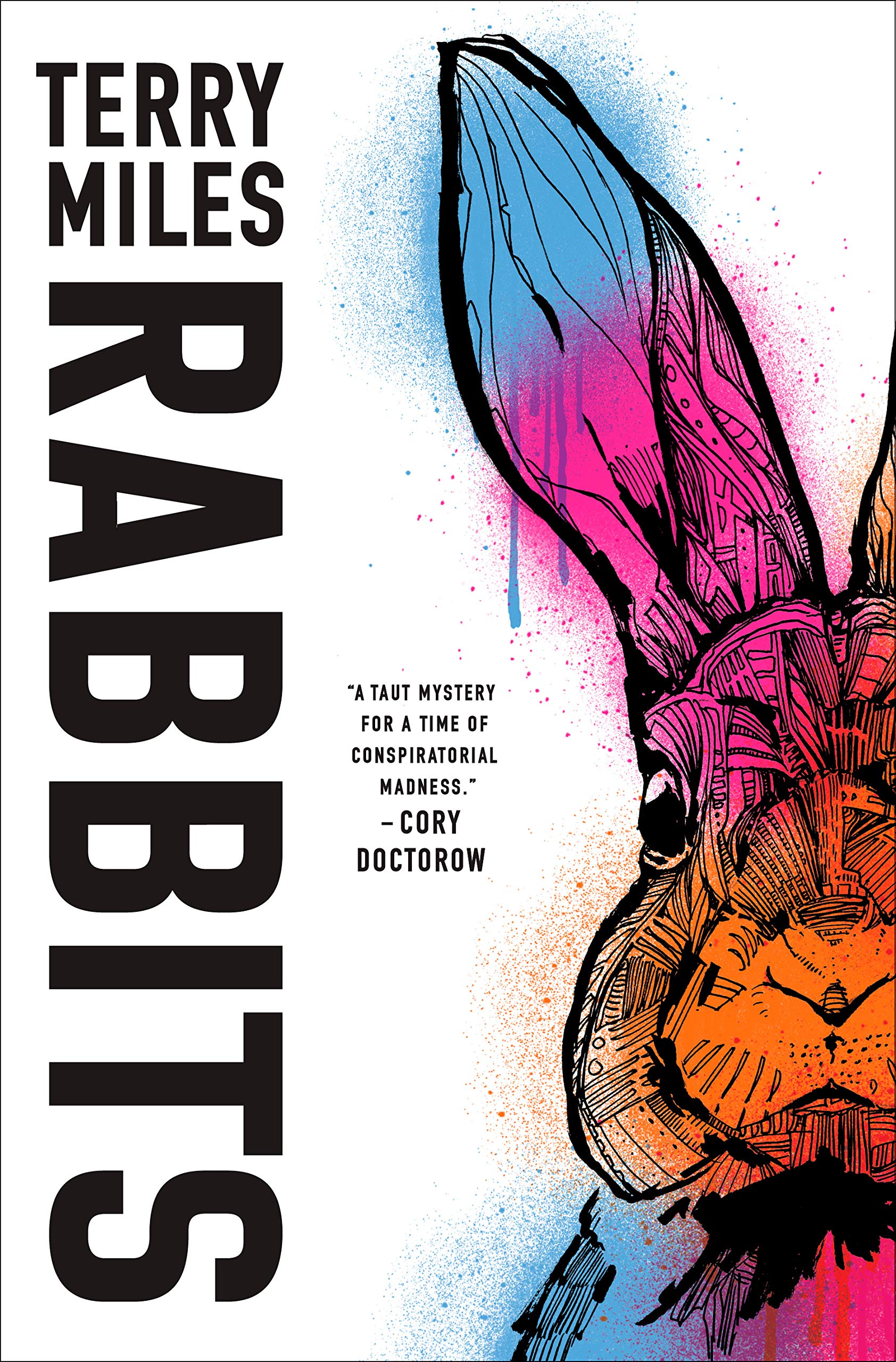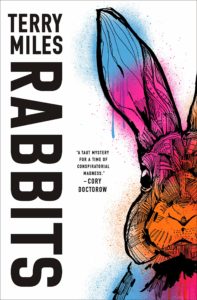
The door is open.
R U Playing?
 Conspiracy theories, reality-altering cosmic powers, and pop-culture references abound in Rabbits, the debut novel from Terry Miles. Stemming from the successful podcast of the same name, Rabbits is a standalone thriller that leaves you questioning the nature of reality–and its permanence.
Conspiracy theories, reality-altering cosmic powers, and pop-culture references abound in Rabbits, the debut novel from Terry Miles. Stemming from the successful podcast of the same name, Rabbits is a standalone thriller that leaves you questioning the nature of reality–and its permanence.
Rabbits introduces readers to a new kind of augmented-reality game (ARG) where participants follow clues in the real world to unlock secrets. In this secret underground game, people may find themselves playing it before they know what it is. No one knows where it started or who controls it. But since the 1950s, people have been playing through different “versions” of the game.
The most important rule? Don’t talk about Rabbits. Players chase clues down “rabbit holes” that leave one questioning if coincidence was ever an option. That’s where K–our faceless, genderless video game-obsessed protagonist–comes into play. An elusive billionaire approaches K with a dire message: something is wrong with Rabbits. Unless they can set the game back on the right track before the next version begins, the players will all be in danger. But it may already be too late: people are disappearing, and Rabbits has begun.
You may already be familiar with author Terry Miles’s work, as he’s responsible for a myriad of successful podcasts including The Black Tapes, Tanis, and The Last Movie. Through Minnow Beat Whale Productions, he also created the 2017 podcast Rabbits, where the titular game of this novel originates. Although Rabbits is a stand-alone novel, I admit that having previous knowledge of the universe helped me understand some of the underlying events of the book.
The premise is the most intriguing part of Rabbits. It’s twisty, clever, and surprising. Miles excels at creating a “mystery box” that promises all kinds of exciting reveals and mysterious elements that one hopes will all make sense once the truth is exposed. What is Rabbits exactly? How do our characters know who to trust? What are these mysterious, shadowy figures lurking on the edges? Is anything coincidence? The secrets woven into the pages of the story rely on the characters’ ability to find clues (including some in the text for clever readers to find).
That said, it doesn’t stop very often to focus on the characters or their relationships beyond the surface. Characters are often rushing from one location to the next chasing clues or interviewing people who often offer infuriatingly small snippets of the truth. Then, the next scene will take place weeks later when the emotional weight of a situation has passed. Although K is interesting, none of the other characters are very well-developed. It almost feels as if you are reading through a video game yourself. You have the main character, then several NPCs inhabiting the story around them. Often, this means that the same conversations are repeated in different variations. Although K glosses over many things I as a reader would have been interested to know, this seems like a stylistic choice more than a failing.
Overall, this is a fun book! There’s a lot of elements that will appeal to those who like surreal science fiction and guessing where the story will go next. Unfortunately, however, the ending doesn’t quit live up to the mystery elements. The book throws in a random curve ball in the very last act (without enough setup to payoff emotionally). It’s never explained or fully explored, leaving threads unraveled and questions unanswered. Normally, a little mystery can be fun, especially if it leaves you thinking. But Rabbits felt abrupt, never exploring any of the truly intriguing possibilities it presents.
While this is a standalone novel, the book rehashes most of the core concepts already touched upon on the podcast. Namely, the elements exploring the nature of game, reality, and whether any of this is real in the first place. I’m curious to see if Miles expands the story. There’s plenty of opportunity either through the podcast (which recently announced a second season) or another book to explore the implications and consequences of the book’s ending.
Rabbits will appeal to anyone who enjoyed the nostalgia-fueled pop culture of Ready Player One or the non-sequitur style of Haruki Murakami. Popular culture, especially video game culture, plays a huge role in the story. Some of the mystery relies on understanding popular games from the ’80s to today. However, it doesn’t push those pop-culture tidbits as aggressively as it could, which was refreshing and prevents it from alienating non-gamers. Despite the issues with the conclusion, there are a lot of things to like about this book. It’s fun and fresh, and with its straightforward prose, Rabbits is a quick read, too. If you’re looking for a conspiracy-laden thriller with a splash of science fiction, this is a perfect summer read!




